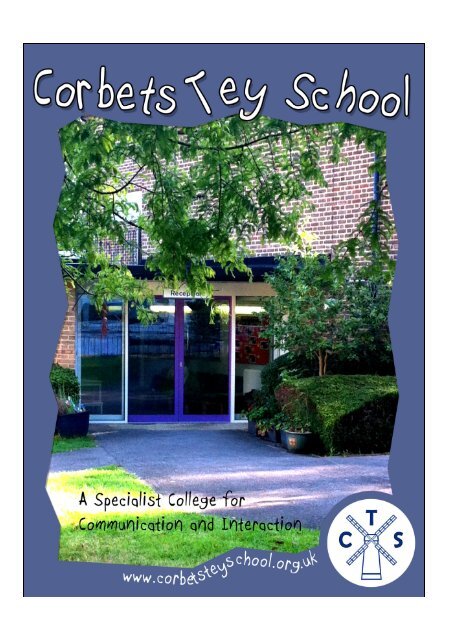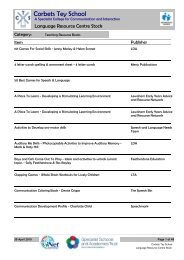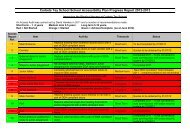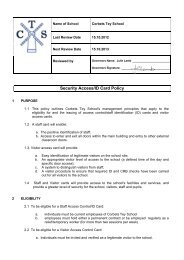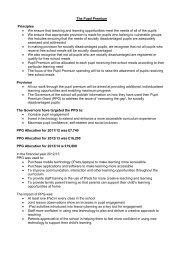Untitled - Corbets Tey School
Untitled - Corbets Tey School
Untitled - Corbets Tey School
You also want an ePaper? Increase the reach of your titles
YUMPU automatically turns print PDFs into web optimized ePapers that Google loves.
About The <strong>School</strong><br />
<strong>Corbets</strong> <strong>Tey</strong> <strong>School</strong> is a forward looking school for<br />
pupils with Complex Learning Needs.<br />
The school is a state maintained, foundation, trust<br />
special school situated in Upminster, Essex in the<br />
south east of the London Borough of<br />
Havering.<br />
Over 100 children and young people<br />
attend the school aged 4 16, all of<br />
whom have statements detailing<br />
particular personal educational needs<br />
with learning challenges of one kind<br />
or another, including autism, and a number of medical<br />
syndromes.<br />
The school has held Specialist Status in<br />
Communication and Interaction since 2007 and<br />
Emma Allen<br />
Headteacher<br />
successfully re-designated in 2010. This has enabled<br />
the school to establish internal specialist units within<br />
Page 2
the school, individual language and communication<br />
programmes throughout the school<br />
and an outreach advisory service to<br />
support language work in other<br />
schools in the borough.<br />
The Governors and staff at the school<br />
are firmly committed to the care of<br />
the children who attend the school.<br />
Our aim is to enable all pupils to<br />
achieve their maximum potential in academic,<br />
physical and moral fulfilment so that they may<br />
ultimately make their valuable contribution to society<br />
and in preparation for later life.<br />
David Dobson<br />
Deputy Headteacher<br />
The school aims to become a Centre of Excellence in<br />
support of its own<br />
pupils and the<br />
local mainstream<br />
school community.<br />
3
The Facilities<br />
<strong>School</strong> Grounds<br />
The school is fortunate to be surrounded by<br />
extremely green trees and field areas.<br />
Areas within the school grounds are sectioned off<br />
to provide play areas for:<br />
· Reception class children including play<br />
equipment, soft surfacing and space for ball<br />
games and bikes;<br />
· Primary age children including play/climbing<br />
equipment, soft surfacing and social seating<br />
and space for ball games and social shelters;<br />
· Secondary age children including separate<br />
play/climbing equipment, soft surfacing and<br />
space for ball games;<br />
· Sports field.<br />
Sensory Playground<br />
The sensory playground is a resource open to<br />
groups and organisations in Havering to register to<br />
use. It has been designed to provide a safe,<br />
sensory experience for children with disabilities. It<br />
has a fully accessible, DDA compliant dedicated<br />
toilet and changing facility.<br />
Page 4
The Facilities<br />
Soft Play Room<br />
The well equipped soft play room allows children to<br />
explore and investigate their physical capabilities in<br />
safe surroundings. The soft play equipment caters<br />
for all age ranges within the school.<br />
Sensory Room<br />
A room for pupils to explore using all their senses.<br />
Switches allow pupils to control the environment<br />
creating light patterns around the room. The room is<br />
used for pupils with visual or sensory difficulties to<br />
work with few distractions, using lights and sounds<br />
to focus on and track.<br />
CDT & Art Room<br />
A space that is used for both CDT and Art<br />
experiences and opportunities. Pupils are<br />
encouraged to explore a wide range of media to<br />
produce some exciting and innovative work and to<br />
develop further practical, independence and life<br />
skills through working with wood, plastics and other<br />
materials and using ICT.<br />
Topic Resource Library<br />
A new development this September to provide a<br />
creative learning space where children can explore<br />
topic related books and activities.<br />
Page 6
Hydrotherapy Swimming Pool<br />
The school has swimming facilities with two<br />
separate pools, one hydrotherapy pool and a larger<br />
swimming pool for more confident swimmers. This<br />
facility is used throughout the school for swimming<br />
lessons and additional swimming activities. This<br />
facility is also used by the community for children<br />
and adults who require a specialist swimming<br />
environment<br />
Hall<br />
The hall area is a multifunction room used for P.E.<br />
using the balancing/climbing/swinging and soft play<br />
equipment. It is also used for the many plays that<br />
the children perform as well as for assemblies<br />
where the children proudly show their work to the<br />
rest of the school.<br />
Sensory Studio<br />
The sensory studio provides a sensory approach to<br />
learning with equipment that has an immediate and<br />
direct change resulting from pupils own actions.<br />
The facilities in this room provide children with the<br />
opportunity to recognise cause and effect thereby<br />
helping to improve co-ordination, awareness and<br />
attention. The multi-sensory environment<br />
complements speech and language work for pupils<br />
within all classes in the school. The space includes<br />
a black room, a light panel, a bubble tube, LED<br />
lighting, a bubble machine, a wind machine, a 3D<br />
LCD television and other sensory equipment.<br />
7
The Facilities<br />
Food Technology Room<br />
A popular room amongst the children is our food technology<br />
room. We encourage pupils to develop as many life skills as<br />
possible, particularly in key stage three and four.<br />
Accessibility and Equality<br />
The school takes its duties and responsibilities under<br />
current equality and accessibility legislation extremely<br />
seriously. The school publish all accessibility and equality<br />
objectives on the school website and information relating to<br />
progress towards these objectives.<br />
The school is constantly developing the school facilities to<br />
improve accessibility for all pupils . We have installed many<br />
adaptations and additions to the school such as DDA<br />
compliant sinks, hobs and worktops in the food technology<br />
room and ramps, hoists and height adjustable changing<br />
beds and toilets in various locations of the school.<br />
Minibuses<br />
By courtesy of our extremely effective Parent and Friends<br />
Association, and support from charitable organisations, the<br />
school benefits from being able to use three minibuses.<br />
These are put to good use in taking children and young<br />
people out to experience the real world.<br />
Page 8
<strong>School</strong> Organisation<br />
The school is organised into four key stages. Pupils<br />
within each key stage are grouped in mixed year<br />
classes. This is based on pupil age/ability including<br />
communication, interaction and sensory needs as well<br />
as the need to create an appropriate and enriching<br />
social group for the pupils. On account of this it is<br />
occasionally necessary for pupils to be taught outside<br />
of their age group so they can mix with a peer group<br />
that will enhance his/her progress in all areas.<br />
Foundation and Key Stage 1.<br />
Learning opportunities are based on the Early<br />
Learning Goals and National Curriculum with plenty of<br />
opportunities for developing communication and basic<br />
skills through play as well as structured, more formal<br />
learning. Learning is active, fun and experiential and<br />
children enjoy a stimulating variety of indoor and<br />
outdoor opportunities.<br />
Key Stage 2 and Key Stage 3<br />
Programmes based on the National Curriculum with<br />
support. Where appropriate, individuals attend<br />
sessions at local schools. All pupils follow a full but<br />
modified National Curriculum including the Literacy<br />
and Numeracy Strategy and a comprehensive<br />
Personal, Social, Health and Citizenship programme.<br />
Page 10
The curriculum is carefully differentiated to provide<br />
learning opportunities that reflect the range of individual<br />
needs, achievements and interests as well as prior<br />
attainment of the pupils. The curriculum is shared with<br />
parents, through an information letter sent out each<br />
term, to encourage support at home.<br />
Key Stage 4:<br />
A balance of National Curriculum and an OCR<br />
accredited Life and Living Skills QCF (Foundation<br />
Learning) qualification offering a large number of 'bitesized'<br />
units, across a wide range of skill areas, at Entry<br />
1, Entry 2 and Entry 3. This qualification has been<br />
designed to be completely flexible, and any<br />
combination of units can be selected to suit the<br />
particular needs and interests of the learner and can be<br />
used as a component for any Foundation Learning<br />
programme<br />
11
Curriculum Areas<br />
Literacy and Numeracy<br />
English and Maths are taught as discreet subjects,<br />
with an emphasis on functional communication,<br />
interaction and<br />
independence. Children<br />
engage in a variety of<br />
activities in circle time,<br />
group work and during 1-1<br />
time. Cross curricular links<br />
with Literacy and<br />
Numeracy help pupils to<br />
further consolidate skills<br />
whilst experiencing an<br />
enriching and engaging<br />
curriculum.<br />
Personal, Social, Health, Moral,<br />
Multicultural, Emotional (PSHMME) and<br />
Citizenship Education<br />
PSHMME aims to give pupils the knowledge, skills<br />
and understanding they need to lead confident,<br />
healthy, independent lives and to become informed<br />
citizens. Pupils are encouraged to take part in a wide<br />
range of activities across and beyond the curriculum<br />
including yoga, horse riding and swimming. Parents<br />
are kept fully informed when aspects of Sex Education<br />
are considered e.g. for senior pupils.<br />
Page 12
ICT receives significant focus throughout the school. The<br />
school has invested heavily into mobile technology hardware<br />
(iPads, laptops, etc.) as well as in specialist applications and<br />
software in recent years, which present a world of extended<br />
learning opportunities for pupils across the whole curriculum.<br />
Making learning accessible lies at the heart of the ICT policy<br />
at the school and development in the technology curriculum<br />
is reflective of the needs of the pupils.<br />
13<br />
Drama is also supported<br />
within the context of the<br />
schools community performances.<br />
The school has<br />
developed creative and expressive<br />
learning opportunities<br />
by working with organisations<br />
such as the English<br />
Touring Opera Outreach<br />
Team. This work has been<br />
outstanding and has lead to<br />
a whole school performance<br />
at the Queens Theatre,<br />
Hornchurch in June 2009.
Science<br />
All pupils at <strong>Corbets</strong> <strong>Tey</strong> <strong>School</strong><br />
follow a full but modified National<br />
Curriculum including Science. The<br />
curriculum is carefully differentiated to<br />
provide learning opportunities, which<br />
reflect the range of individual needs,<br />
interests and past achievements of<br />
pupils in each age group.<br />
The science curriculum has been developed using<br />
science schemes such as Astra Zeneca Science<br />
Teaching Trust, the Equals Schemes and the National<br />
Curriculum. The curriculum incorporates half termly<br />
units from the following themes: life processes and<br />
living things, materials and their properties, and<br />
physical processes.<br />
Religious Education<br />
Religious education follows the London Borough of<br />
Havering Syllabus. Whole school community<br />
sessions take place during assembly. At particular<br />
times in the year broadly<br />
traditional Christian<br />
events are held. Any<br />
parent wishing to<br />
withdraw a child from<br />
any of these is invited to<br />
discuss this with the<br />
school.<br />
Page 14
Creative Arts<br />
The arts are considered important areas of<br />
development within the school and our pupils benefit<br />
greatly from these learning opportunities. Pupils Art<br />
is entered in the Havering Young Artist competition<br />
annually.<br />
Physical Education<br />
Exercise and fitness is a key focus within the school.<br />
Group aerobic sessions are organised and run three<br />
times a week after lunch. This has shown to enhance<br />
behaviour in the afternoon and has helped to focus<br />
pupils so that engagement in lessons has increased.<br />
All pupils then have access to other physical<br />
education opportunities such as dance, yoga,<br />
swimming which greatly enriches the curriculum and<br />
pupil enjoyment of school. The school also offers<br />
after school clubs with a focus on sports.<br />
Work related learning is supported throughout the<br />
school. Pupils in key stages 2, 3 or 4 have<br />
opportunities to develop work and enterprise related<br />
skills and knowledge through course or topic activities.<br />
Pupils make and sell products to raise money for inschool<br />
or external charitable purposes.<br />
In key stage 4, pupils have the opportunity to engage<br />
in work experience away from the school<br />
environment to extend their understanding<br />
of adult work and to develop<br />
their independence.<br />
15
Extended Services<br />
All sessions and services provided outside school<br />
hours are open and accessible to all pupils in the<br />
school during the year constrained only by popularity<br />
and maximum numbers.<br />
After-<strong>School</strong> Clubs<br />
Various clubs are offered at various times throughout<br />
the year, dependent upon sufficiently available funding<br />
and staffing. All clubs reflect the diversity of the<br />
school population.<br />
Some examples of after school club activities offered<br />
in the past have been:<br />
· Cooking & Life Skills<br />
· Multi Sports<br />
· Sound Beam<br />
· Choir (lunchtime club)<br />
· Yoga<br />
· Chit Chat Club (at the end of the Summer Term<br />
(for Y11 leavers)<br />
· Swimming After-<strong>School</strong> and Weekend Swimming<br />
Sessions<br />
· Drama<br />
Residential Trips are organized by classes and all<br />
pupils in the classes are fully involved regardless of<br />
their disability or any other reason.<br />
Page 16
<strong>School</strong> Holiday Activities<br />
The Parents and Friends Association (PFA) provide<br />
financial support for various holiday activities. Some<br />
recent exampes of this are:<br />
Fun Splash Swimming Sessions in the school<br />
Hydrotherapy Swimming Pool during school holiday<br />
periods. These are open to all pupils attending the<br />
school and to students with disabilities attending<br />
mainstream schools in Havering.<br />
This facility is also hired during the school holidays by<br />
local playschemes and respite providers.<br />
Sensory Playground Sessions have a first aid<br />
trained member of school staff present.<br />
This facility can also be booked for use by local<br />
groups and organisations working with children with<br />
disabilities and their families and is accessible to all<br />
children in Havering through the sessions arranged<br />
through the PFA and registered groups.<br />
17
Specialist <strong>School</strong> Status<br />
<strong>Corbets</strong> <strong>Tey</strong> <strong>School</strong> has Specialist <strong>School</strong> Status in<br />
Communication and Interaction. The school was<br />
awarded this in 2007 and successfully redesignated<br />
on 2010.<br />
Specialist Status has enabled the school to develop<br />
facilities and services to better support pupils and<br />
their families. It has also enabled the school to build<br />
on specialist internal practice more fully and work<br />
externally with a range of local authority schools and<br />
services.<br />
The school supports the London Borough of Havering<br />
by providing specialist training, support and advice in<br />
teaching children with learning needs and particularly<br />
Autism.<br />
Learning Resource<br />
Centre<br />
This is a two<br />
Story Extension<br />
to provide<br />
Offices, Meeting<br />
Room and<br />
Resource<br />
Sharing<br />
Facilities.<br />
Page 18
Outreach Programmes into the Wider<br />
Community<br />
Training and support in the delivery of Verbal<br />
Behaviour programmes for pupils in mainstream<br />
schools who are identified as having severe barriers<br />
to functional language development. <strong>School</strong>s can<br />
receive a regular intensive training block where input<br />
is delivered at least once a week, and then ongoing<br />
advice and support.<br />
AAC<br />
The school has become involved in developing the<br />
provision of Augmentative, Alternative Communication<br />
(AAC) devices in Havering. Through our specialist<br />
status we have been able to contribute to this<br />
important initiative in collaboration with the Learning<br />
Support Service and other special schools in the<br />
borough.<br />
A Specialist <strong>School</strong><br />
Through specialist status the school has become an<br />
outward facing centre of excellence in the London<br />
Borough of Havering providing strong support to many<br />
other schools and young people.<br />
19
Specialist Work at CTS<br />
In <strong>Corbets</strong> <strong>Tey</strong> <strong>School</strong> we recognise every child as an<br />
individual.<br />
We use an eclectic approach to developing the skills<br />
of children with autistic spectrum disorder. In all of<br />
our classes we are happy to use and develop<br />
whatever approach suits each individual child.<br />
Approaches may include:<br />
· Signing to support language development;<br />
· Structured teaching approaches;<br />
· Language for learning programmes;<br />
· Social use of language programmes;<br />
· PECS picture exchange communication<br />
system.<br />
A wide range of language and communication<br />
development strategies and interventions are used<br />
throughout the school as well as Makaton Signs and<br />
Symbols.<br />
Within their first year at the school, pupils are carefully<br />
monitored and those who need a Verbal behaviour<br />
approach to teaching language are identified.<br />
Page 20
Specialist Classes<br />
Holly and Ivy Classes are a specialist provision with a<br />
curriculum based on Verbal Behaviour principles and<br />
access to the National Curriculum. The classes<br />
provide permanent, dedicated areas to carry out the<br />
Verbal Behaviour programme and consist of class<br />
rooms and a further room/areas for intensive one-toone<br />
programmes, and for children to develop their<br />
language through natural environment teaching.<br />
The classes have a capacity for 15 children with a<br />
staffing ratio of 7 adults including 2 qualified teachers.<br />
All staff have ongoing training from a Board Certified<br />
Behaviour Analyst.<br />
Each child has a daily programme which includes<br />
one-to-one teaching at the intensive teaching table<br />
and in the natural environment. They also get daily<br />
opportunities to practise and generalise skills in a<br />
range of settings including, soft play, sensory room,<br />
NET room, large play equipment in the hall and the<br />
library.<br />
Pupils are assessed and tracked daily using the<br />
ABLLS and P Levels.<br />
What is verbal behaviour (VB) ?<br />
VB is a behavioural approach to teaching<br />
communication skills to children with autism<br />
and other developmental disabilities.<br />
21
Page 22
Outreach Programmes into Classes<br />
Pupils who are able to benefit from broader National<br />
Curriculum programmes in our regular classrooms with a<br />
more diverse peer group are able to access Verbal<br />
Behaviour programmes delivered by staff who have had<br />
intensive training and experience of teaching in Holly and Ivy<br />
Classes.<br />
This allows continued individualised teaching towards the<br />
ABLLS goals whilst in a less intensive environment.<br />
23
Parent Training Opportunities<br />
When children are identified as having the specific<br />
language needs to benefit from a verbal behaviour<br />
approach parents are offered a place for their child<br />
within the group and training in the principles of verbal<br />
behaviour.<br />
Individualised training has included:<br />
· Intense training in the delivery of programmes for<br />
parents wishing to extend teaching hours at home<br />
· Advice and training on specific areas of language<br />
development or behaviour modification<br />
· Support in the home for individual issues.<br />
As well as training in Verbal Behaviour techniques,<br />
other examples of training opportunities that the<br />
school has provided to parents include:<br />
· iPad Training Sessions<br />
Termly iPad training covering basic operation<br />
including setting up, syncing, installing apps, etc<br />
as well as more advanced activities and<br />
settings.<br />
These sessions also provide advice and<br />
guidance on the educational opportunities that<br />
this new technology can bring to children with<br />
and without learning disabilities.<br />
Page 24
· Makaton Training Sessions<br />
The Makaton ® Taster Workshops provide<br />
parents with a general introduction to Makaton ®<br />
and its use and introduce parents to key signs<br />
and symbols, delivered by an approved<br />
Makaton ® tutor.<br />
These sessions introduce basic signing skills<br />
and knowledge of symbols to support parents in<br />
communicating with their children using<br />
Makaton ® .<br />
25
Destination of <strong>School</strong> Leavers<br />
Our young people upon leaving school after year 11<br />
continue into some form of continuing education. In<br />
recent years this has included a unit based at<br />
Ravensbourne <strong>School</strong>, Trinity <strong>School</strong>, Quarles<br />
Campus Havering College, Barking College or<br />
continuing school education in provision outside the<br />
local authority.<br />
Celebration of Achievement<br />
In <strong>Corbets</strong> <strong>Tey</strong> <strong>School</strong> we believe in recognising and<br />
celebrating the achievements of our pupils. This<br />
shows them that they are appreciated and respected<br />
and raises their self-esteem and confidence.<br />
Celebration of achievement takes a variety of forms<br />
but particularly takes place weekly in our Show<br />
Assembly.<br />
Page 26
Community Ethos<br />
Our Singing and Signing Show Assemblies are one of<br />
the outcomes of the strong community ethos of the<br />
school. The school community is very important and<br />
this extends to include the parent body, then on to the<br />
wider community which includes the mainstream<br />
school community with which <strong>Corbets</strong> <strong>Tey</strong> <strong>School</strong> has<br />
excellent two-way links. The staff work collegially <br />
supporting each other,<br />
and students are<br />
encouraged to join in<br />
with this ethos,<br />
engaging with the<br />
school identity for their<br />
own, and wider benefit.<br />
Inclusion<br />
The school aims to offer each child and young person<br />
the maximum opportunity to achieve their individual<br />
potential including preparation for life. It prides itself<br />
on the strength of its two-way links with the<br />
mainstream education sector.<br />
27
Pupil Voice<br />
Our Pupil <strong>School</strong> Council is very<br />
active and meet regularly to discuss<br />
the school issues that are important<br />
to them. All pupils representing<br />
their peers on the school council<br />
follow a fair and independent<br />
selection process. Pupils vote for<br />
someone who they feel can represent<br />
their views in the best way.<br />
<strong>School</strong> Councils are made up of a<br />
cross section of the school age range<br />
and are a fair representation of the<br />
school population in terms of<br />
ethnicity, gender, disability and other<br />
minority groups.<br />
Whole school feedback is regularly<br />
sought in assemblies where all<br />
pupils are encouraged to give their<br />
views on the school.<br />
Their input is invaluable when<br />
planning new projects around the<br />
school such as the purchase and<br />
installation of new playground<br />
equipment. Pupils are the experts in deciding what is<br />
needed and wanted within this type of project and<br />
therefore are involved from the earliest stage<br />
in project development.<br />
Page 28
Attendance<br />
Attendance of children and young people is extremely<br />
important for us. We appreciate very much indeed the<br />
support we know we receive from our parent body in<br />
this regard.<br />
Attendance is monitored closely and children and<br />
young people are encouraged to attend and the best<br />
attendance class awarded is announced during Show<br />
Assemblies. Parents are requested to phone in when<br />
their child is away from school and follow up with a<br />
letter explaining the absence more fully on the childs<br />
return to school. If a child must be taken out of school<br />
for a holiday, it is important to note that they are<br />
entitled to only 10 days off during any one school<br />
year. Parents are asked to request permission from<br />
the headteacher prior to the holiday using the<br />
appropriate holiday form.<br />
<strong>School</strong> Uniform<br />
Pupils across the school are very proud of their<br />
uniform and are encouraged to take pride in their<br />
personal appearance. Parents can purchase items of<br />
uniform, P.E. clothing, school bags and other items<br />
directly from Premier <strong>School</strong> Wear 688-690<br />
Becontree Avenue, Dagenham, Essex. RM8 3HD.<br />
Tel: 020 8592 0141 by visiting the shop or ordering<br />
directly from the shop website at<br />
www.premierschoolwear.com.<br />
29
Annual Reports<br />
Annual reports are published at the end of the<br />
summer term to cover the period of the previous<br />
academic year.<br />
Annual Reviews<br />
Every child and young person attending the school<br />
will have a statement which will be reviewed at least<br />
annually. Advice will be obtained from teachers and<br />
any involved professionals. Parents and pupils are<br />
invited to share their views<br />
Learning Assessments and Targets<br />
Each child and young person is set regular targets<br />
through a Personal Assessment Plan. Through this<br />
tool, teachers carry out an accurate, ongoing,<br />
continuous assessment of progress with identified<br />
targets and other learning outcome during each and<br />
every lesson. Targets are set that measure and<br />
record progress in areas that are most functional and<br />
meaningful for each pupil. Parents are encouraged to<br />
be involved in this process so that meaningful home<br />
and school targets can be identified for each child.<br />
Achieved new skills will be shared with parents each<br />
term.<br />
Assessments of progress are also carried out on a<br />
termly basis set against P levels and national<br />
curriculum levels. These assessments will be shared<br />
with parents annually during annual review meetings.<br />
Page 30
Admissions<br />
Children and young people<br />
can be admitted at any<br />
time during the academic<br />
year but it has become<br />
usual in recent years for<br />
the school to have its full<br />
complement by the<br />
beginning of the school academic year.<br />
All pupils coming to the school have a statement of<br />
Special Educational Needs. Admission is through<br />
Havering SEN department who have a panel to<br />
decide when admission to our school may be<br />
appropriate. The SEN Education Department is<br />
based at London Borough of Havering, Mercury<br />
House, Mercury Gardens, Romford, Essex.<br />
Visitors are very welcome to our school.<br />
Contact should be made to view the school to<br />
David Dobson or Susan Cumbers<br />
on 01708 225888 or by email:<br />
scumbers@corbetstey.havering.sch.uk.<br />
Safeguarding<br />
<strong>Corbets</strong> <strong>Tey</strong> <strong>School</strong> is committed to Safeguarding and<br />
promoting the welfare of children and young people.<br />
To achieve our commitment, we will ensure<br />
continuous development and improvement of<br />
robust Safeguarding processes and<br />
procedures that promote a culture of<br />
Safeguarding amongst our staff and<br />
volunteers.<br />
31
CORBETS TEY SCHOOL<br />
A Specialist College for<br />
Communication and Interaction<br />
Harwood Hall Lane,<br />
Upminster,<br />
Essex. RM14 2YQ<br />
Tel: 01708 225888<br />
Fax: 01708 220430<br />
E-mail: office@corbetstey.havering.sch.uk<br />
Headteacher: Emma Allen<br />
Chair of Governors: Julie Lamb<br />
Page 32


